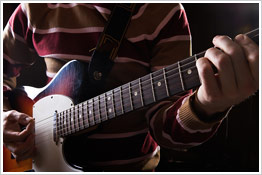Confidence When Performing
By Jeanne Sparks
Question
What can I do to gain more confidence, especially for performances?
Answer
 I am very big on performance confidence. Getting a clear sense of what performing is all about definitely makes a positive difference. I emphasize to my students, and I have it in their instructions, that the purpose of our recitals is to "express, not to impress." They are there to express beautiful music, not to impress people with their skills. I've even shared this idea in horse circles at clinics. I have told people, "Don't worry. Just express what you know and don't be concerned with what other people are going to think about you or your horsemanship." I am very big on performance confidence. Getting a clear sense of what performing is all about definitely makes a positive difference. I emphasize to my students, and I have it in their instructions, that the purpose of our recitals is to "express, not to impress." They are there to express beautiful music, not to impress people with their skills. I've even shared this idea in horse circles at clinics. I have told people, "Don't worry. Just express what you know and don't be concerned with what other people are going to think about you or your horsemanship."
There is a visualization exercise I give my students, which makes a huge difference. This concept I gleaned from a horse book about success in showing horses. Other sports and even businesses have tuned into its effectiveness. Every day for two weeks before a performance, my students are supposed to picture themselves getting out of their seat gracefully, walking to the piano bench, bowing (which equals saying "hello" graciously), and then positioning themselves properly at the piano.
With the score in hand, they must hear their entire piece of music in the inner ear—feeling the rhythm, hearing the articulation and note accuracy, along with all of the dynamics that they are seeing on the page. I ask my students to visualize everything they're going to do and play, expecting a perfect performance, focusing on what's good and beautiful, right and joyous. Both their confidence and their performance improve because their performance aligns with their clear thinking.
I also talk to my students about getting rid of negativity, also known as fear and/or nervousness. We've all seen the "devil" or the "angel" on the shoulders. The devil, imp, whatever you want to call it, is negative. It's so important not to listen to the negative that would say, "I can't do that," or "I am really shaking." So they have to mentally brush the imp off BEFORE they start. Students have excelled keeping the imp off the shoulder. They are also finding that concept useful in their school work, especially for examinations.
A long time ago, a colleague of mine came out with a course on performance anxiety, explained in big plastic binders and recorded on cassette tapes. I listened to the tapes and thought the goal was good. However, she was approaching it from the wrong angle. I do not want performance anxiety. I want performance confidence, so we need to think confidence from the very beginning. We always have confidence when we have paid our dues to the "practice club" of consistent, thoughtful, and slow practice. To those students who want to prepare at the last minute, I suggest they are putting themselves in a "cactus corner" which gets rather prickly.
Performing is a skill that requires practice, just as learning to drive a car or fly a plane, or to sew or cook. Confidence grows with additional, successful experiences, no matter the category. I feel piano recitals prepare students to give a talk in their school classrooms as well as in the business world. Even though they are not speaking, they are talking in body language. Some of the students start out physically shaking, and after several recitals, they recognize much progress. Performance goes along better if you visualize a performance as a comfortable situation. That is the deal.
One of my favorite Bible passages I hold in my thought is from II Timothy 1:7: "For God hath not given us the spirit of fear; but of power, and of love, and of a sound mind." |

